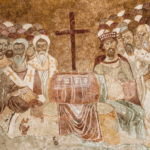From time to time, readers send us emails questioning some theological point they have discovered in a post or review. Here is a response to one such note concerning TGCA’s article on the Bethel network. See the second response here
Dear M_______,
Thank you for your email about our article on the Bethel movement. It is a great help when readers take the time to press us on the things we write—especially when they challenge us using the Bible as you have.
It is a great help when readers take the time to press us on the things we write—especially when they challenge us using the Bible as you have.
I am sure that we would agree on many of the things you write, but I guess the sticking point comes down to the way think about miracles and their role in the life of the Christian. Obviously this is a really big topic, but I thought I would like to respond to two key arguments (one in this post, the second in another) you make from the life and ministry of Jesus.
Jesus, Miracles and Us
The first point you make is that we should expect modern Christians to be doing miracles because Jesus said we should expect it: you mention Mark 16:17-18; Matthew 10:8 and John 14:12.
“And these signs will accompany those who believe: in my name they will cast out demons; they will speak in new tongues; they will pick up serpents with their hands; and if they drink any deadly poison, it will not hurt them; they will lay their hands on the sick, and they will recover.” (Mark 16:17-18)
“Heal the sick, raise the dead, cleanse lepers, cast out demons. You received without paying; give without pay.” (Matt 10:8)
“Truly, truly, I say to you, whoever believes in me will also do the works that I do; and greater works than these will he do, because I am going to the Father.” (John 14:12)
Let’s have a look at each of these in turn.
Mark 16:17-18
Now, we should note that this section is generally regarded as an addition to the original Gospel. As William Lane summarises it in his commentary:
The earliest Greek, versional and patristic evidence supports the conclusion that Mark ended his Gospel at Ch. 16:8 … 16:9-20 is a mosaic which is clearly secondary in character, which serves to round off the [message] of the primitive church with a reference to Christ’s ascension.
Nevertheless, let’s set that aside and note that all the things mentioned here—with the exception of drinking poison—do happen amongst Jesus’ followers in the pages of Scripture. Even the deliverance from snakebite occurs with Paul in Malta (Acts 28:1-6).
Paul, in 1 Corinthians 12:27-30, makes it clear that not everyone speaks in tongues or heals.
Does this mean, however, that we should expect these things to happen to each and every Christian? The statement “these signs will accompany those who believe,” could simply mean that these things will (and did) occur amongst Jesus’ followers. In fact that must be the truth of the matter (regardless of whether the passage is original), because Paul, in 1Corinthians 12:27-30, makes it clear that not everyone speaks in tongues or heals.
This also fits with the emphasis of other parts of the Bible. In Acts 4:30 (after the arrest of Peter and John), the believers ask God to “stretch out your hand to heal, and [perform] signs and wonders … through the name of your holy servant Jesus.” And God does. In verse 12 of the next chapter we read that “many signs and wonders were regularly done among the people by the hands of the apostles.”
Notice that “by the hands of the apostles.” That doesn’t mean they are absolutely the only ones doing miracles (Stephen does some in Acts 6:8) but it does show us an emphasis. The apostles had a very special place amongst God’s people—they were Jesus’ first and most important witnesses (Acts 15:27)—and God confirmed that by revealing the same sort of signs that he did in the life of Jesus.
I think this should be our starting point in thinking about signs and wonders. Unlike some readers, I do not think the Bible teaches us that God will never do miracles today (and I know of a number of instances where it seems he has), but I don’t think we should expect the same outpouring of miracles that occurred amongst Jesus and his representatives. Those “signs” were just that: signs that showed the unique character of those that did them. As Jesus says:
“The works that I do in my Father’s name bear witness about me … believe the works, that you may know and understand that the Father is in me and I am in the Father.” (John 10:25,38)
And as Paul writes of himself:
“The signs of a true apostle were performed among you with utmost patience, with signs and wonders and mighty works.” (2Cor 12:12)
Matthew 10:8
So, we shouldn’t confuse our own place in God’s plan with that of Jesus and the apostles. This point is doubly true when it comes to Matthew 10:8. Here, Jesus’ command to “Heal the sick, raise the dead, cleanse lepers, cast out demons,” comes in the very precise context of Jesus sending out the apostles for a short-term mission. The instructions he gives here don’t even apply to the apostles permanently. Here he tells them to stay away from the Samaritans (v5) and not to carry any money (v9). But before his death he tells them that things will be different in the future: they should carry a bag and a purse, and maybe even get a sword (Luke 22:35-37). Later still, in Acts 8, Peter and John (and the Holy Spirit) clearly have no problem with preaching the gospel to the Samaritans.
These instructions don’t even apply to the apostles permanently. If they stopped applying to them, why would we think they apply to us?
All this means that we need to be really careful in thinking through the context of commands like these. If they stopped applying to the apostles, why would we think they apply to us? I don’t mean that passage doesn’t speak to us today (all Scripture is God-breathed and useful for us; 2Tim 3:16), but it does mean we will have to think a bit harder about how it speaks today.
John 14:12
Now, when you quoted this passage, I noticed you said that Jesus says we would do “more miracles” than him. But that’s not quite what Jesus says, is it? He says that “whoever believes in me will also do the works that I do; and greater [things] than these.” Not “more” but “greater”. Not “miracles” but “works/things”.
So what are these “greater works” that Jesus says we will do?
Let’s notice to start with that they are works that every Christian will do. This isn’t like Mark 16 where the miracles just accompany believers in general, these works apply to whoever believes (literally “the one believing”) in Jesus.
This immediately creates a problem if we think that Jesus is talking about miracles, because it would mean that every single Christian—not just the big name faith healers and church leaders—should be doing greater miracles than Jesus. Is that what we see? Do we observe all Christians raising the dead, curing paralysis and healing people born blind? If we don’t, we must either conclude that Jesus got it wrong or that “greater works” means something other than more or better miracles.
What does Jesus mean, then? Let me suggest a couple of clues from John and a less direct clue from Luke.
True Greatness (1)
The first clue is that the reason why we will be doing greater things is because Jesus is going to the Father (v12) and so that God the Father will be glorified in Jesus his Son (v13). This doesn’t tell us what the works are but it tells us what makes them great: not that they are supernatural, but because—whatever they are—they are connected to Jesus and his glory.
True Greatness (2)
The second clue comes from earlier in the gospel where Jesus tells a hostile crowd that:
… the Father loves the Son and shows him all that he himself is doing. And greater works than these will he show him, so that you may marvel. For as the Father raises the dead and gives them life, so also the Son gives life to whom he will. For the Father judges no one, but has given all judgment to the Son, that all may honour the Son, just as they honour the Father. (John 5:20-23)
Now, when Jesus says, “greater works than these” he is, as Don Carson points out in his commentary, using just the same words that Jesus uses in John 14:12. And here, those greater works are things greater than the miracles. They include giving life to spiritually dead people (vv24-25) and judging the world (v27).
We Christians have a greater ministry than Jesus because we can bear witness to his whole and completed ministry.
Jesus says God has given both these great works to Jesus to do so “all may honour the Son, just as they honour the Father,” (v23). So once again, greatness is all about the greatness of Jesus and it isn’t limited to miracles. The greatest things Jesus does involve the life and death (and death to life) of sinners.
I think this already helps us see that we shouldn’t be fixated on miracles. If we want to know true greatness we should be obsessed with Jesus and his saving work.
Jesus makes an astonishing statement: We Christians who come after Jesus’ death and resurrection have a greater ministry than Jesus had when he was on earth—not because we are doing better miracles—but because we can bear witness to his whole and completed ministry. We know how he made it possible for dead people to live (he died our death for us!) We can point to a saviour who has already finished his mission and ascended to rule the universe. We can call on a glorified king to help us. These are the things that make for greatness.
True Greatness (3)
Finally, In Luke 7, when John the Baptist is put in prison, he hears about Jesus’ ministry and seems to worry that Jesus isn’t getting on with the final judgement. He sends some of disciples to ask Jesus about it, and Jesus responds with a very interesting comment about John the Baptist. He says that John is a great prophet. But he also says:
“I tell you, among those born of women none is greater than John. Yet the one who is least in the kingdom of God is greater than he.” (John 7:24)
Here again, Jesus is talking about greatness in the same way. Why is John the greatest? Not because of his miracles (he never did any c.f. John 10:41), but because he is the last prophet who comes right before Jesus: “This is he of whom it is written, ‘Behold, I send my messenger before your face, who will prepare your way before you.’” (v27 c.f. Mal 3:1) No other prophet gets to point to the fulfilment of God’s signs and promises— only John!
And yet even the most insignificant Christian is greater. Why? Because John is still too early. He doesn’t know what we know. He doesn’t understand the full picture of the cross and the ascension. He’s confused by facts that the most ignorant Christian understands. His knowledge and message is just a shadow of ours.
Miracles and Greatness
Greatness and great works can’t be about miracles. If the greatest miracle workers were the greatest, then Moses and Elijah would be much greater than John. But true greatness—the kind that God wants us to pursue—is all about his Son. God might or might not do miracles in our lives—it doesn’t matter very much. What he really wants us all to know is how great Jesus is, and how great it is to be able to tell people about Jesus and his saving work.
I will leave it there. I hope it helps clarify what we are on about at TGCA and also that it might convince you to think differently about the significance of miracles. In my next letter I will try to deal with the thorny question you raise about Jesus and the Holy Spirit.
Many blessings,
Andrew















